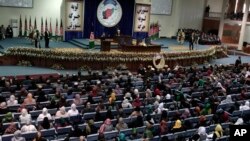A national assembly of Afghan leaders continues to consider a new security pact with the U.S. on Friday following an abrupt move by Afghan President Hamid Karzai.
Karzai surprised U.S. and Afghan officials on Thursday when he said he is considering delaying the signing of the Bilateral Security Agreement until after the April 2014 Afghan presidential elections.
White House officials said failure to finalize an agreement within the coming weeks would prevent the United States and its allies "from being able to plan for a post-2014 presence" in Afghanistan.
Karzai's latest move jeopardizes international funding for Afghanistan, and comes after he gave an impassioned speech to 2,500 tribal, community and elected leaders, voicing his support for the pact.
Saying he had the support of Afghanistan's major allies and neighbors except Iran, Karzai encouraged the assembly, known as the Loya Jirga, to vote for the security pact.
The deal would take effect January 1, 2015 and allow for the possibility of keeping U.S. troops and civilian personnel in Afghanistan through 2024, and possibly even longer.
During his speech, Karzai read out parts of a letter from President Obama that promised the United States would continue to "respect the sanctity and dignity of Afghans in their homes" under the new security agreement.
Obama's letter, released by the Afghan government, also said many Americans have died or been seriously wounded in an effort to help and protect the Afghan people.
A draft text of the agreement said U.S. troops will only enter Afghan homes in exceptional cases, a topic that had been a point of contention for nearly a year during negotiations on the agreement.
The Loya Jirga is expected to spend several days debating the pact, which will shape the security relationship between Washington and Kabul for years to come. The group must give its approval before the document goes to the Afghan parliament for a vote.
Karzai surprised U.S. and Afghan officials on Thursday when he said he is considering delaying the signing of the Bilateral Security Agreement until after the April 2014 Afghan presidential elections.
White House officials said failure to finalize an agreement within the coming weeks would prevent the United States and its allies "from being able to plan for a post-2014 presence" in Afghanistan.
Karzai's latest move jeopardizes international funding for Afghanistan, and comes after he gave an impassioned speech to 2,500 tribal, community and elected leaders, voicing his support for the pact.
Saying he had the support of Afghanistan's major allies and neighbors except Iran, Karzai encouraged the assembly, known as the Loya Jirga, to vote for the security pact.
The deal would take effect January 1, 2015 and allow for the possibility of keeping U.S. troops and civilian personnel in Afghanistan through 2024, and possibly even longer.
During his speech, Karzai read out parts of a letter from President Obama that promised the United States would continue to "respect the sanctity and dignity of Afghans in their homes" under the new security agreement.
Obama's letter, released by the Afghan government, also said many Americans have died or been seriously wounded in an effort to help and protect the Afghan people.
A draft text of the agreement said U.S. troops will only enter Afghan homes in exceptional cases, a topic that had been a point of contention for nearly a year during negotiations on the agreement.
The Loya Jirga is expected to spend several days debating the pact, which will shape the security relationship between Washington and Kabul for years to come. The group must give its approval before the document goes to the Afghan parliament for a vote.





